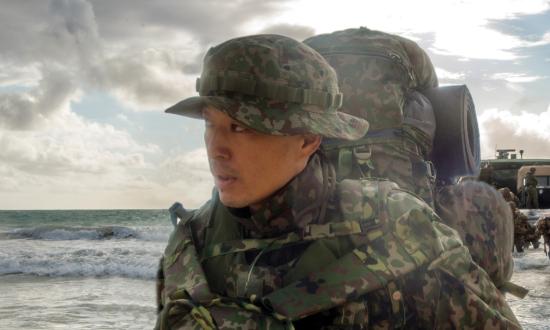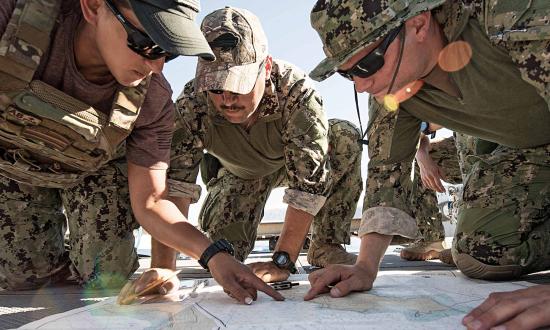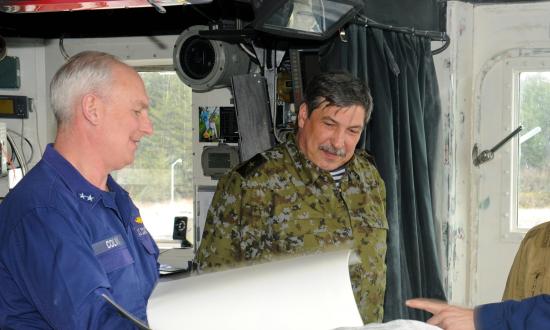“The demand for Coast Guard capabilities is increasing, both domestically
and in support of the DoD Combatant Commanders and American
embassies across the world. ”
—Admiral Karl Schultz
The U.S. Coast Guard is an instrument of national power, used domestically and abroad to protect vital U.S. maritime interests. But despite its role in global affairs, the service’s approach to alliances and partnerships is ad hoc, and it lacks a formal career path for officers to build foreign area expertise. To meet the demand for its capabilities across the globe and remain a pillar of maritime global governance, the Coast Guard must institutionalize a foreign area officer (FAO) specialty and career path built on the foundation of Coast Guard institutional subject matter expertise.1
A Global Coast Guard . . .
The Coast Guard’s footprint spans the globe. On any given day, some personnel will execute narcotic interdictions in the eastern Pacific while others combat illegal, unreported, and unregulated fishing from Oceania to Africa. The service conducts joint exercises with foreign forces, including the Japan Coast Guard in the Indo-Pacific, NATO allies and partners in the Black Sea, and the Royal Danish Navy in the Arctic. Patrol Forces Southwest Asia in Bahrain directly supports the Department of Defense (DoD) in defending U.S. interests and preserving maritime security.
In addition, the Coast Guard is represented in 35 countries with permanent change of station assignments and maintains more than 60 active multilateral and bilateral agreements. Its International Port Security Program engages with nearly 145 countries, and it continues to build partner-nation capacity through international training engagements and security cooperation and assistance.
The Coast Guard is uniquely suited to liaise with foreign partners and allies to provide expertise in diverse mission areas. The challenge, however, is the absence of institutionalized foreign area expertise.
. . . Requires Global Expertise
Although it values international partnerships and foreign area expertise at the micro level, the Coast Guard does not look at international affairs, defense readiness operations, and foreign area expertise from a macro level. It is the only military service without a FAO program. Neither does it have a defined international affairs or defense readiness operations career path. Without these, the service does not have a formal way to cultivate foreign area expertise or develop the personnel and policy or governance elements critical to meeting U.S. foreign policy objectives.
Most overseas Coast Guard officer billets are one-off assignments. Because there is no FAO career path, officers are not incentivized to pursue multiple overseas assignments and so do not build on the skills and expertise gained. The talent management system encourages them to return to their primary career specialties. If they do choose to pursue FAO-type assignments, they do so at their own career risk, as promotion boards do not view overseas assignments as contributing expertise to a career specialty.
In addition, many Coast Guard officers will not fill an international billet until they are an O-5 or O-6. For the first time in their careers, they will serve overseas, in a joint, interagency environment, tasked with representing U.S. and service interests to external audiences. The learning curve is significant, and these officers may be the only Coastie in the entire country or region. Given the increasing complexities of the geostrategic environment, Coast Guard officers need a deeper expertise in global affairs before their first assignments.
For example, the service recently added O-6 attachés as the sole Coast Guard representatives to the People’s Republic of China and the Russian Federation. These billets are of vital strategic importance; they should not be an officer’s first international assignment. Understanding the complexities of global affairs, interagency and U.S. government foreign policy, and regional politics and dynamics is critical for success in such billets. With a FAO program, officers could take overseas assignments earlier in their careers and continue to use the expertise they develop in strategic assignments such as attachés and security cooperation officers.
In early 2021, the U.S. Air Force restructured its FAO program, establishing it as a primary career field. The intent is to provide “an increased return on FAO investment” and develop “deepened regional expertise” among fewer officers, lessening training demands.
In September 2020, recognizing the importance of Indo-Pacific expertise, then–Secretary of Defense Mark Esper directed military departments to review and revise selection board precepts and orders to emphasize the importance of having senior leaders with Indo-Pacific regional experience.
The Coast Guard does not have a viable career path for officers to obtain expertise in global affairs, let alone regional ones.
A Way Ahead
To best employ its unique authorities and capabilities abroad, the Coast Guard should create a FAO specialty synchronized with the DoD Joint FAO Program. This would enable the service to cooperatively defend and secure the homeland while meeting new and future global demands.
The Coast Guard complements the Department of Defense in the cooperation-competition-conflict continuum. While conflict is primarily a DoD mission, the Coast Guard can bolster the cooperation and competition components with a formal FAO program, playing a critical role in bridging U.S. foreign policy efforts. As Coast Guard Commandant Admiral Karl Schultz has noted, “The U.S. Coast Guard provides soft power, multimission flexibility, trusted access, and nonkinetic options to advance U.S. interests, preserve U.S. security and prosperity, and address wide-ranging threats and challenges.”2
As the Coast Guard modernizes its inventory and infrastructure to meet the rising and complex demands of its global missions, there is a parallel need to modernize its personnel management system. Overseas cutter deployments, joint training and operations with international allies and partners, theater security cooperation, and building partner-nation capacity are operational actions that strengthen coast guard-to-coast guard relationships. Coordinating and optimizing such engagements is best done not by the operators, but by Coast Guard officers assigned overseas in FAO-type billets.
The Human Connection
The human connection is a vital part of working within international networks. A modern cutter fleet with increased capabilities has enabled the Coast Guard to meet the demand for collaboration with partner nations. But to fully integrate with the other services and foreign partners and allies, the service needs a properly trained workforce with the area knowledge and expertise to conduct international affairs and prepare operators for success in their missions abroad.
It needs a cadre of career specialists skilled in languages, versed in the intricacies of foreign policy, international relations, and cultural norms, and equipped to represent U.S. national security and Coast Guard needs abroad. Small investments in a FAO program today will pay grand dividends in the future.
1. FAOs are “regionally focused experts in political-military operations” who possess a “unique combination of strategic focus, regional expertise, with political, cultural, sociological, economic, and geographic awareness, and foreign language proficiency.”
2. ADM Karl L. Schultz, USCG, “State of the Coast Guard 2021."







